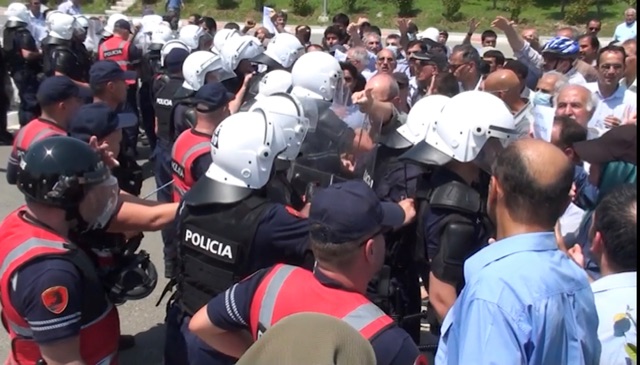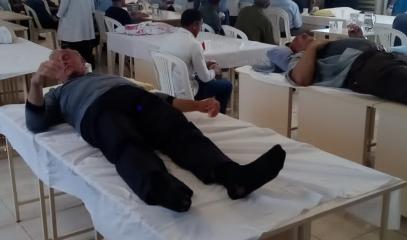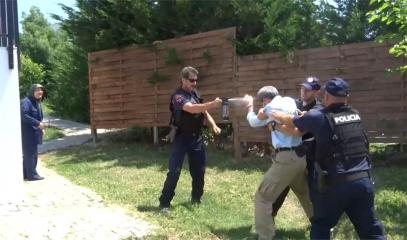Albanian police and Iranian group exchange accusations after man dies in clashes
The People's Mojahedin Organisation of Iran has reported the death of a man and hundreds injured in a camp located north-west of the Albanian capital that is home to thousands of its members and their families. The Albanian government says that its action is part of a wider police investigation. Computers and other equipment were seized. Iran attacks the group again, calling it a “terrorist organisation”.
Tirana (AsiaNews) – Albanian police raided the Ashraf-3 refugee camp on the north-western outskirts of the Albanian capital, Tirana, where thousands of members of the People's Mojahedin Organisation of Iran (MEK)[*] and their families have been living for over a decade.
As a result of the clashes between law enforcement and camp residents, one person died and hundreds were injured from pepper-spray, some of them taken to Tirana’s Mother Teresa Hospital. Police also seized scores of computers.
Outlawed in Iran, the MEK is one of the most active groups opposing the theocratic regime established in the wake of the 1979 revolution.
In a statement, the National Council of Resistance of Iran (NCRI), which is dominated by the MEK, slammed the “criminal and suppressive onslaught” by more than a thousand police agents, which caused the death of Abdul Wahab Farajinejad (Ali Mansherari).
The NCRI calls on the United States and the United Nations to guarantee “the safety and well-being of the residents of Ashraf” and protect them from “outlaw" actions that “flagrantly violate many international treaties,” like the Convention relating to the Status of Refugees, the Universal Declaration on Human Rights, and the European Declaration of Human Rights.
For the Iranian group, the Albanian government, by its violent crackdown (see videos), acted “At the behest of the religious fascism ruling Iran.”
Albanian agents “broke many doors, closets, and equipment and attacked the residents with tear gas and pepper spray. Many computers were broken or taken away.”
“The actions of the Albanian police are reminiscent of the criminal attacks by Nouri al-Maliki forces on Camp Ashraf in Iraq between 2009 and 2015.”
MEK is suspected of carrying out cyber-attacks against foreign institutions. In a statement, Albanian police said that they had acted on a court order due to the "violation of agreements and commitments" made by the group "when they settled in Albania solely for humanitarian purposes."
Albanian Interior Minister Bledi Cuci and senior police officials deny any responsibility in the death of the elderly man as the MEK claimed. Mr Cuci noted that the death had nothing to do with the actions of the police.
The minister insisted that the MEK’S reaction was unacceptable, intolerable, and reprehensible, adding that some 15 police officers and 21 members of the MEK were injured and several police cars were damaged.
The incident began when MEK members resisted police after they found server rooms and computer equipment. Suspecting they were illegal, police seized 96 computer units and about 50 laptops and tablets. They also reported an attempt to burn documents during the raid.
The operation was part of an investigation by the Special Anti-Corruption Agency (SPAK).[†] “The prosecutor's office has initiated several criminal cases, but I cannot tell you why the Iranians of the MEK are suspected," Cuci said.
The minister refused to confirm links between the group and cyber-attacks last September on Albania, which led to a serious falling out between Tirana and Tehran that resulted in Albania cutting off diplomatic relations.
Iran’s Foreign Ministry reacted to developments in Albania by renewing its verbal attacks against the MEK, which it called a terrorist organisation.
For the ministry’s spokesman, Nasser Kan'ani, the MEK “will always be a threat to the security of their host due to their terrorist nature. For this reason, the Iraqi government expelled them and other governments refused to accept them.”
Iran accuses the group of carrying out assassinations and bombings against Iranian government and civilian targets, backed by Iraq’s dictator Saddam Hussein.
It claims that out of the nearly 17,000 Iranians killed in terrorist attacks since the Islamic Revolution, about 12,000 were victims of the MEK.
[*] Mojahedin-e-Khalq.
[†] Struktura e Posaçme Anti-Korrupsioni (Special Anti-Corruption Structure)
08/09/2022 17:44
12/12/2005









.png)










